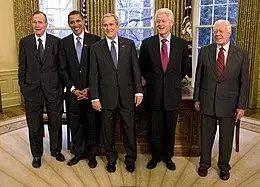Bush family
The Bush family is an American dynastic family that is prominent in the fields of politics, news, sports, entertainment, and business, founded by Obadiah Bush and Harriet Smith.
Best known for its involvement in politics, the family has held various national and state offices spanning across four generations, including a U.S. Senator, Prescott Bush, a Governor, Jeb Bush, and two U.S. Presidents—one having also served as Vice President, George H. W. Bush, while the other was also a Governor, George W. Bush. Other family members include a National Football League (NFL) executive, Joe Ellis, and two nationally known TV personalities, Billy Bush and Jenna Bush Hager.
George Herbert Walker Bush (June 12, 1924 – November 30, 2018) was an American politician, diplomat and businessman who served as the 41st president of the United States from 1989 to 1993. A member of the Republican Party, Bush also served as the 43rd vice president from 1981 to 1989 under Ronald Reagan, in the U.S. House of Representatives, as U.S. Ambassador to the United Nations, and as Director of Central Intelligence.
George Walker Bush (born July 6, 1946) is an American politician and businessman who served as the 43rd president of the United States from 2001 to 2009. A member of the Republican Party, he had previously been the 46th governor of Texas from 1995 to 2000. He was born into the Bush family: his father, George H. W. Bush, was the 41st president of the United States from 1989 to 1993.
On July 25, 2000, Bush surprised some observers when he selected Dick Cheney—a former White House chief of staff, representative and secretary of defense—to be his running mate. At the time, Cheney was serving as head of Bush's vice presidential search committee. Soon after at the 2000 Republican National Convention, Bush and Cheney were officially nominated by the Republican Party.
Bush continued to campaign across the country and touted his record as Governor of Texas. During his campaign, Bush criticized his Democratic opponent, incumbent Vice President Al Gore, over gun control and taxation.
When the election returns were tallied on November 7, Bush had won 29 states, including Florida. The closeness of the Florida outcome led to a recount. The initial recount also went to Bush, but the outcome was tied up in lower courts for a month until eventually reaching the U.S. Supreme Court. On December 9, in the controversial Bush v. Gore ruling, the Court reversed a Florida Supreme Court decision that had ordered a third count, and stopped an ordered statewide hand recount based on the argument that the use of different standards among Florida's counties violated the Equal Protection Clause of the Fourteenth Amendment. The machine recount showed that Bush had won the Florida vote by a margin of 537 votes out of six million casts. Although he had received 543,895 fewer individual nationwide votes than Gore, Bush won the election, receiving 271 electoral votes to Gore's 266 (Gore had actually been awarded 267 votes by the states pledged to him plus the District of Columbia, but one D.C. elector abstained). Bush was the first person to win an American presidential election with fewer popular votes than another candidate since Benjamin Harrison in 1888.
In his 2004 bid for re-election, Bush commanded broad support in the Republican Party and did not encounter a primary challenge.
The Bush campaign advertised across the U.S. against Democratic candidates, including Bush's emerging opponent, Massachusetts Senator John Kerry. Kerry and other Democrats attacked Bush on the Iraq War, and accused him of failing to stimulate the economy and job growth. The Bush campaign portrayed Kerry as a staunch liberal who would raise taxes and increase the size of government. The Bush campaign continuously criticized Kerry's seemingly contradictory statements on the war in Iraq, and argued that Kerry lacked the decisiveness and vision necessary for success in the War on Terror.
Following the resignation of CIA director George Tenet in 2004, Bush nominated Porter Goss to head the agency. The White House ordered Goss to purge agency officers who were disloyal to the administration. After Goss' appointment, many of the CIA's senior agents were fired or quit. The CIA has been accused of deliberately leaking classified information to undermine the 2004 election.
In the election, Bush carried 31 of 50 states, receiving 286 electoral votes. He won an absolute majority of the popular vote (50.7 percent to his opponent's 48.3 percent). Bush's father George H.W. Bush was the previous president who won an absolute majority of the popular vote; he accomplished that feat in the 1988 election. Additionally, it was the first time since Herbert Hoover's election in 1928 that a Republican president was elected alongside re-elected Republican majorities in both Houses of Congress.
From left to right: George H. W. Bush, Barack Obama, George W. Bush, Bill Clinton, and Jimmy Carter.

六级/考研单词: bush, prominent, entertain, nationwide, span, senate, vice, soccer, diplomat, unite, ambassador, intellect, workforce, mate, convention, nominate, democracy, incumbent, supreme, controversy, reverse, tertiary, violate, million, electoral, pledge, encounter, advertise, stimulate, portray, contradict, necessity, terror, administer, quit, deliberate, leak, classify, undermine, accomplish, feat, congress




 浙公网安备 33010602011771号
浙公网安备 33010602011771号